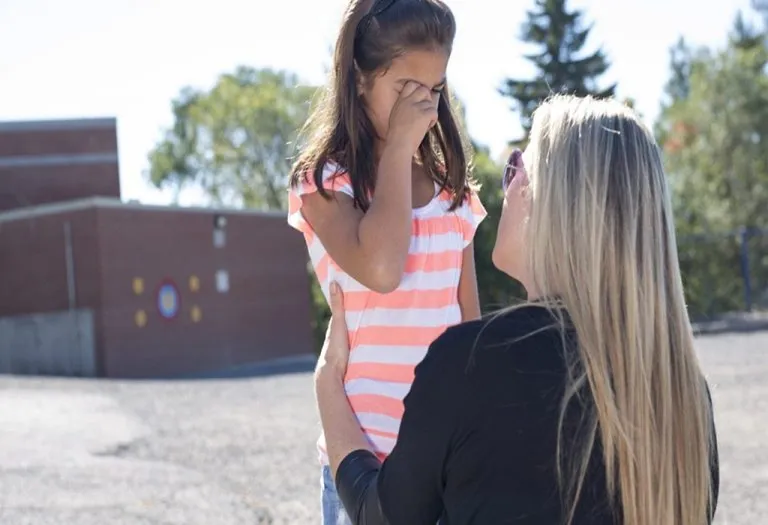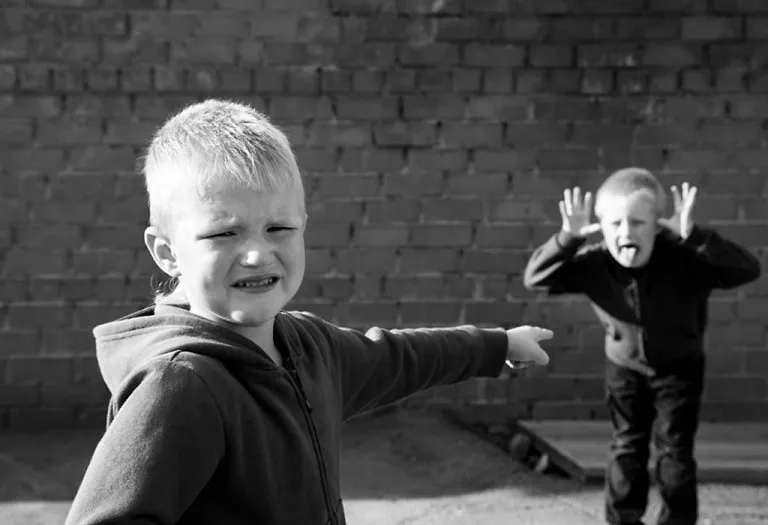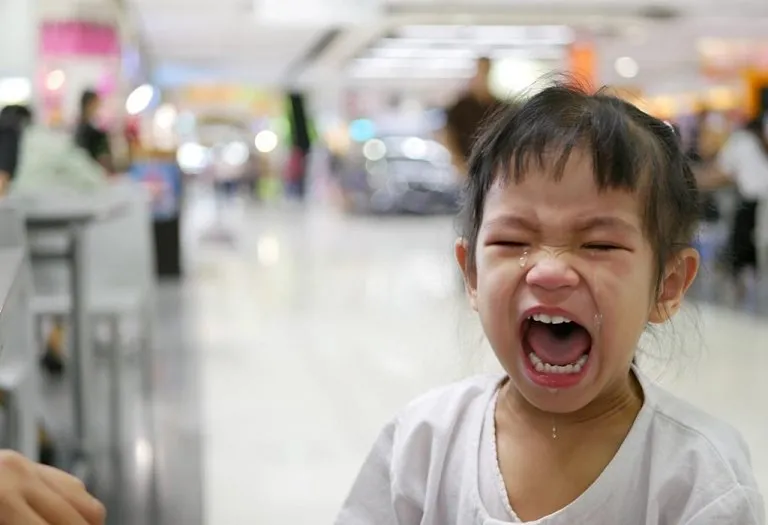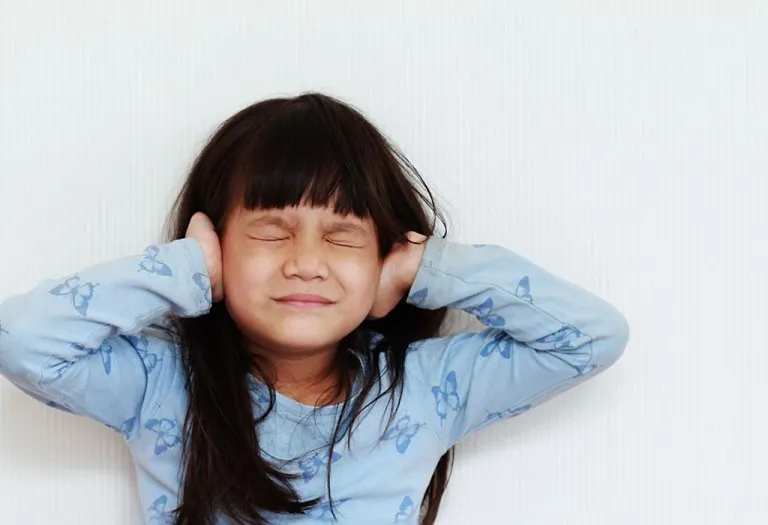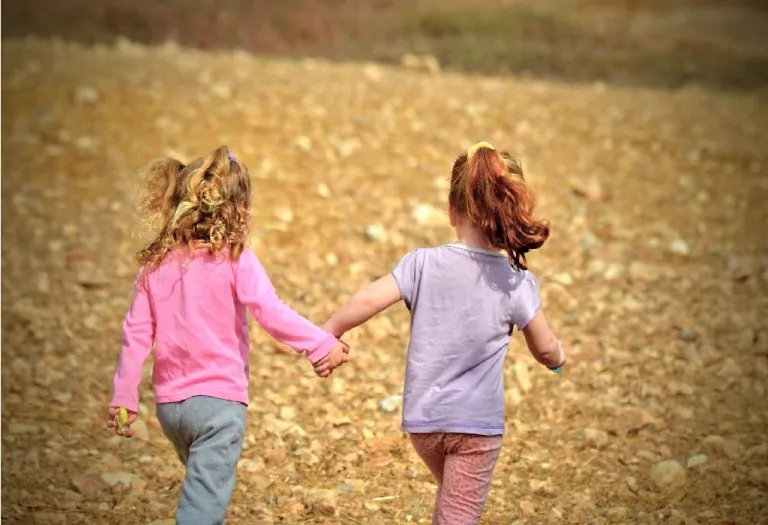Fear of School (Scolionophobia) – Reasons, Signs and Treatment

- What Is School Refusal in Children?
- Who Gets School Phobia and How Common It Is?
- Causes of Fear of School in Kids
- Symptoms of School Phobia
- Consequences of School Refusal
- Tests to Diagnose Scolionophobia
- Treatment of School Phobia
- Other Therapies and Medication for Children Who Experience School Phobia
- Is Follow-up After Treatment Essential?
- What Should Schools Do to Cope With School Refusal?
- What Can Parents Do About It?
- How to Control or Prevent School Refusal?
- Prognosis of School Phobia
- Question You Should Ask to Your Child’s Healthcare Provider
- FAQs
You must have had one of those days when your child didn’t want to go to school, probably because of their incomplete assignment or any test they want to miss. This is school anxiety. However, when a child has a fear of even attending school, this is termed school phobia or school refusal (1). Although it is not a clinical diagnosis, it is a symptom and a problem worth noticing. This problem is also termed ‘school refusal’, and is common to a great extent. Tackling such problems can be difficult but not impossible. Parents must analyse the probable causes behind such behaviour to make the child feel more comfortable about going to school. This article will help you understand several aspects of school phobia and how parents can deal with it and help their kids manage it.
What Is School Refusal in Children?
According to Stanford Medicine, school refusal syndrome occurs when the child simply refuses to go to school, owing to some reason or the other (2). The child may not want to go to school or simply refuse to do so due to fear or some other reason. He could also have a school avoidance disorder, which may even manifest as physical symptoms, like sickness or general sadness in the mornings. Due to anxiety, the child may prefer staying at home and doing other activities instead of going to school. The American Family Physician noted that although school refusal happens in all ages, it is found common in children around the ages of five, six, 10, and 11 (3).
Although school refusal occurs at all ages, it is more common in children five, six, 10, and 11 years of age.6 No socioeconomic differences have been noted
Who Gets School Phobia and How Common It Is?
Many children develop separation anxiety when they are away from their caregivers, but usually grow out of it. However, some children do not grow out of this type of anxiety and develop scolionophobia, which later surfaces when they have to go to school. According to the Cleveland Clinic, scolionophobia stays with the child for a long time (4). While mostly children develop school phobia who have overprotective caregivers, some may develop it without any reason because of their anxiousness. Children may also develop school phobia if they are only one child, the youngest one, or are chronically ill. Although school refusal occurs equally in both boys and girls, a reasearch published n the the Journal of School Psychology found that students who identified as LGBTQ+ took more unexcused absences than their heterosexual classmates (5).
Causes of Fear of School in Kids
The reasons behind why the child has school phobia can be many, and it is important to understand them from the child’s perspective. Some common reasons behind school refusal syndrome are given below (6):
- Anxiety about being evaluated: A school is a place of constant evaluation, where all the capabilities of the child are measured and put up on display. If the child refuses to go to school on certain days, such as sports day or mandatory public speaking days, he may feel anxious about having to perform under pressure, and thus choose to avoid the entire episode.
- Separation anxiety: It is not just babies that face separation anxiety; grown-up kids can experience it, too. Having been raised by caring parents, the prospect of being thrust into an environment where such care is not given can be harsh for the child.
- Academic problems: Academic problems or learning difficulties are common in children, and the pressures associated with them can grow to such an extent that the child may choose to avoid school altogether.
- Peer issues: A school is a place where the child has to interact with a multitude of other people, including his peers. Social isolation, bullying or conflicts with friends are common among children, so the child may refuse to go to school entirely (7).
- Conflict with teachers: If your child finds a teacher intimidating, he might avoid school altogether.
- Traumatic events: Some traumatic events like separation of the parents, the death of a family member or divorce can result in school refusal in children.
- Transition: Moving to a new school or even a new place can make it difficult for the child to adjust, and he may choose to stay at home in a comfortable environment rather than go to school.
- Rewards at home: Staying at home means that they get to spend time with their parents or do trivial fun activities like watching TV. The child may choose to do that instead of spending time at school.
Symptoms of School Phobia
School phobia is something that can easily be noticed, especially by parents. There are obvious symptoms that show the child does not like going to school, including straightforward refusal. Here are some more common symptoms:
- The child may cry and get tearful over the prospect of going to school and plead with the parents to let him stay at home.
- Tantrums, dawdling or even running away from school are other common symptoms.
- In order to fake a legitimate reason, the child may complain about illnesses like stomach ache, headaches or dizziness when the time to go to school arrives (8).
- Another common symptom is when the child has a noticeable difficulty to return to school after long absences, like holidays, vacations or even sports days.
- The child may choose to spend time elsewhere without going to school and have long, unexplained absences.
- Occasionally, the child may miss classes or be absent for specific periods with no real explanation given.
- Late arrival at school is another manifestation of school refusal syndrome in children.
- In order to stay away from the spotlight, the child may be a frequent visitor to the sick bay at school.
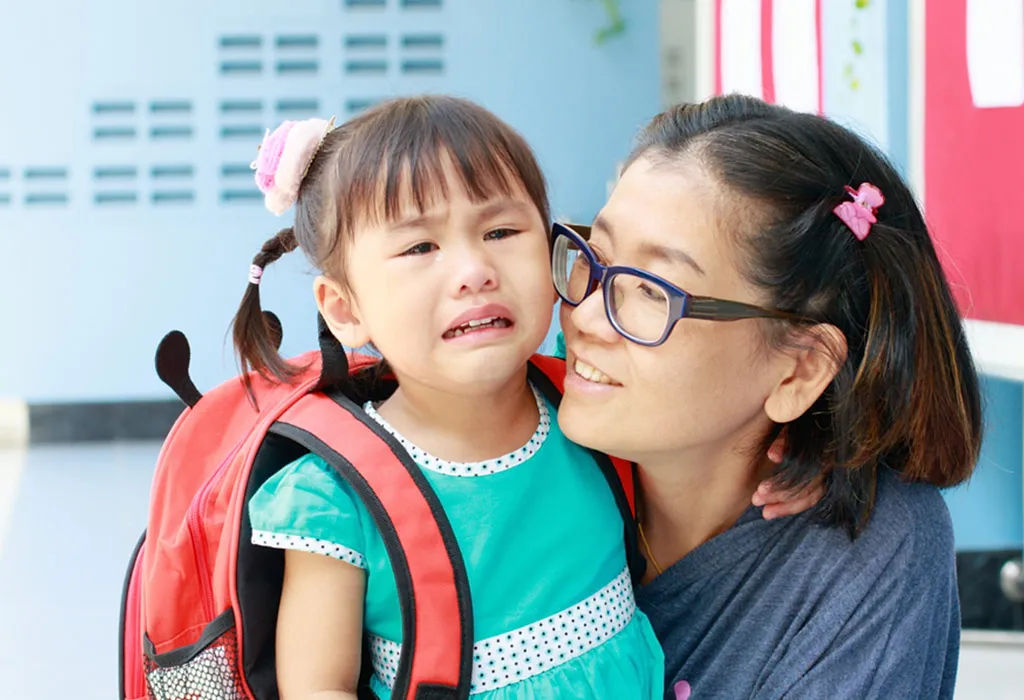
Consequences of School Refusal
Schools play a huge role in the development of children. Going to school not only gives them an opportunity to gain adequate knowledge about the world but also cultivates their personalities. Schools put children in an unknown environment and prepare them for the real world and adulthood right from the start. Not attending school can make children lag behind in terms of mental and emotional development, and they may end up being clingy towards their parents.
Tests to Diagnose Scolionophobia
Here are a few useful tools with the help of which you can determine whether your child is going through school withdrawal:
- The Child Behavior Checklist (CBCL) – CBCL is a questionnaire for parents or caregivers to assess behavioural and emotional problems in kids.
- The SCARED Test – The SCARED test is the Screen for Child Anxiety Related Emotional Disorders. It is an instrument used to analyse general anxiety disorder, separation anxiety disorder, panic disorder, and social phobia in kids.
- The Children’s Manifest Anxiety Scale – It is used to assess the level and nature of anxiety in children.
- Children’s Global Rating Scale (CGAS) – It is a scale used to analyse the level of functioning in children and adolescents.
Treatment of School Phobia
The treatment largely involves a psychological approach, and various counselling and desensitisation techniques.
- Cognitive Behavior Therapy: It is a derivative of Behavior Therapy, and is done to correct inappropriate and maladaptive behaviour in the children.
- Systematic Desensitisation: The child is gradually taught and helped to modify his reaction to school and make it less harsh on himself emotionally.
- Exposure Therapy: The child is exposed to the stressful environment gradually, and is guided throughout to correct his maladaptive reactions to the situation and cope well with the changes.
- Operant Behavioral Techniques: This involves rewarding the child for the desired behaviour so that the frequency of the behaviour increases.
Other Therapies and Medication for Children Who Experience School Phobia
Serotonin reuptake inhibitors like Prozac are useful when trying to cure depression in a child. However, these have to be used with caution as children can become dependent on the drugs, thereby worsening the depression. Such dependency can also increase the chances of bipolar disorders and suicidal tendencies. Sudden discontinuation can also cause anxiety, insomnia and headaches in the child.
Some drugs which help the child mask the symptoms of anxiety, like sweaty palms and racing hearts, are also useful. However, drugs like propranolol have to be used with the utmost care, and never in asthma patients. These medicines should also not be discontinued suddenly, as it can lead to an increase in blood pressure.
Is Follow-up After Treatment Essential?
If the child is being or has been treated for school withdrawal syndromes, after-treatment follow-ups are absolutely essential. The child has to be monitored closely by the family, school staff and the treating professionals in the period after treatment.
What Should Schools Do to Cope With School Refusal?
The American Academy of Pediatrics suggests a few ways schools could cope with school refusal in children (1).
School Refusal Strategies at the Policy Level
- Create a positive school atmosphere with a strong sense of community between the students and the teachers.
- Establish peer support and mentoring programs so that students have a feeling of belonging.
- Make the children understand the importance of constant attendance in school.
- Closely monitor student attendance so that such problems can be detected early.
School Refusal Strategies at the Individual Level
- Understand why the child is missing school, and obtain information or reasons with the help of the family.
- Maintain close relationships with the family, even if the child is missing school consistently.
- Understand that parents face just as many challenges as the school, to get the child to attend.
- Provide recognition or positive feedback to children who are trying to bring up their attendance levels.
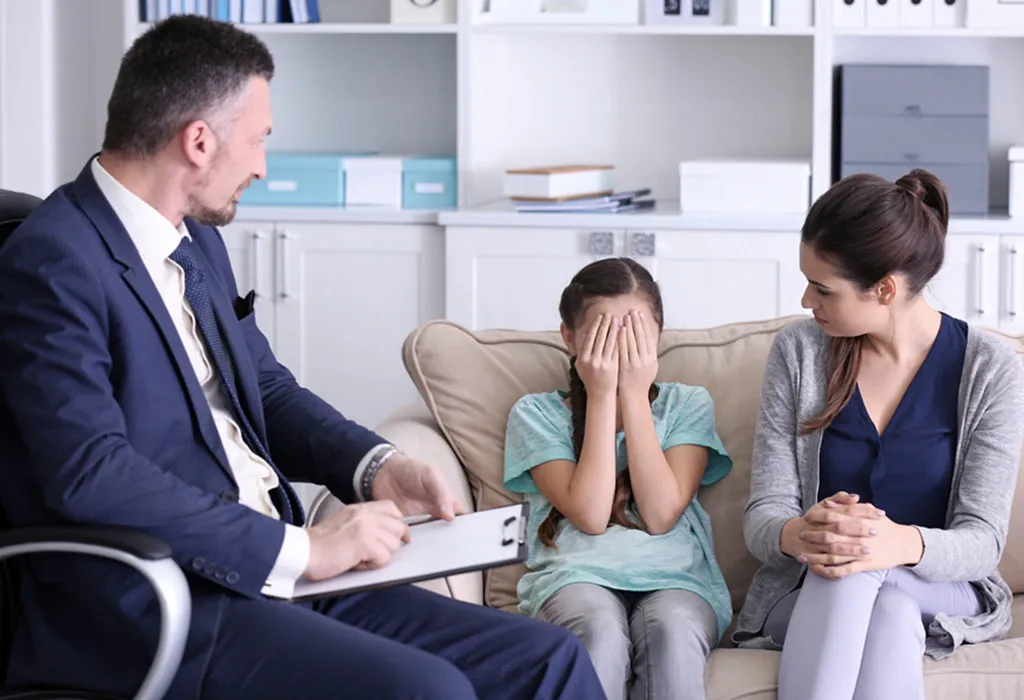
What Can Parents Do About It?
Parents dealing with a child with school refusal can consider the following approaches.
1. While Talking to the Child
- Talk to your child about the measures you can take to ensure he is comfortable at school.
- Talk positively, and show your child that you believe that he can tackle the problems at school to build his self-confidence.
- Be calm and clear while speaking, and use ‘when you go to school…’ rather than ‘if’.
- Do not give your child a chance to say ‘no’ by using direct statements.
2. While You Are At Home
- Always remain calm and never appear frustrated at the situation.
- Establish routines regarding the school in the morning and evening, like folding the uniforms or packing the bags for the next day.
- Make your home ‘boring’ during the school hours, so that the child is not enticed to stay there.
- Get your child’s sleep cycle right.
3. Getting to School
- Let somebody else drop your child at school, as your home is the better place for separation rather than the school gates.
- Let your child know that you are proud of him for going to school despite it being hard.
- Reward your child with something at the end of the day for going to school.
4. Working With School
- Talk to the teachers or the principal for advice regarding the situation.
- Get a referral towards a good counsellor or psychologist.
- Set up regular appointments with the primary contact at school – class teacher, principal, or even the support staff.
How to Control or Prevent School Refusal?
- Listen to what the child has to say regarding the reasons for his behaviour to understand whether there is any bullying or peer pressure involved.
- Another important thing in dealing with school refusal is to get your child to attend school regularly and on time so that it becomes a habit.
- Reinforce your child’s self-confidence and make him believe that he is strong enough to get over this problem.
- Reassure the child by saying that the parent or caregiver will be at home when he returns from school, and reiterate how boring the home is during the time he is in school.
Prognosis of School Phobia
If a preschooler refuses to go to school, it is nothing new. The routine usually improves with a little bit of care and counselling by the parents and teachers. However, if the problems tend to go on far too long or become worse, the prognosis is still excellent with the help of professional treatment.
Question You Should Ask to Your Child’s Healthcare Provider
When getting your child diagnosed, there are some cautionary questions you may ask your child’s healthcare provider. Here are some questions:
- What is the most probable cause of school phobia in my child?
- Should I get my child a mental health diagnosis?
- What can I do on an individual level to overcome scolionophobia?
- Should I take my child to a child psychologist or a therapist?
FAQs
1. When does school avoidance or school refusal start?
The understanding of the possibility of avoiding school can develop in children anytime they are able to think through. However, it usually takes place in children around the age of five to six and between 10 and 11, which is the time of transition from middle to high school.
2. Are there any conditions that may put my child to a risk of scolionophobia?
Yes, there are some conditions that may likely put your child to a risk of scolionophobia (9):
- Social anxiety disorder
- Generalized Anxiety Disorder (GAD)
- Post-traumatic Stress Disorder (PTSD)
- Depression
- Obsessive Compulsive Disorder (OCD)
- Oppositional Defiant Disoder
3. How does anxiety impacts academia?
Constantly facing frustration and pressure to succeed at school can be stressful, especially when they don’t perform well. Individual differences, whether due to ADHD, anxiety, or learning disabilities, exist from the start. For some children, school isn’t a good fit, making avoidance understandable. Anxiety can also lead to school avoidance in other ways, such as separation anxiety, social anxiety, phobias, OCD, and depression (10).
School can be a daunting process for children, so the refusal to go to school is nothing new; it is a common behavioural trait among children. While this can be tackled with the help of some small lifestyle and attitude changes by the parents, you might need to get professional support if the school refusal behaviour worsens over time.
References/Resources:
1. School Avoidance: Tips for Concerned Parents; American Academy of Pediatrics; https://www.healthychildren.org/English/health-issues/conditions/emotional-problems/Pages/School-Avoidance.aspx
2. School Refusal; Stanford Medicine; https://www.stanfordchildrens.org/en/topic/default?id=school-refusal-90-P02288
3. Fremont. W. P; School Refusal in Children and Adolescents; American Family Physician; https://www.aafp.org/pubs/afp/issues/2003/1015/p1555.html; October 2003
4. Scolionophobia (Fear of School); Cleveland Clinic; https://my.clevelandclinic.org/health/diseases/23982-scolionophobia-fear-of-school
5. Burton. C. M, Marshal. M. P, Chisolm. D. J; School absenteeism and mental health among sexual minority youth and heterosexual youth; J Sch Psychol.; PubMed Central; https://www.ncbi.nlm.nih.gov/pmc/articles/PMC4058829/; February 2014
6. School Refusal; Anxiety & Depression Association of America; https://adaa.org/find-help/by-demographics/children/school-refusal
7. Kearney. C. A, Silverman. J, et al.; The Functional Assessment of School Refusal Behavior; The Behavior Analyst Today; Volume 5, Issue Number 3; https://files.eric.ed.gov/fulltext/EJ1072107.pdf; 2004
8. How to Help Your Child With School Phobia; University of Utah; https://healthcare.utah.edu/the-scope/kids-zone/all/2023/08/how-help-your-child-school-phobia; August 2023
9. School Refusal: A Complete Guide; McLean Hospital; https://www.mcleanhospital.org/essential/school-refusal
10. Avoiding and Refusing to Go to School; Yale Medicine; https://www.yalemedicine.org/conditions/school-related-problems
Also Read:
Nightmares in Children
Childhood Fears and Phobia
How to Get Rid of Shyness in Children?
How to Deal with ‘Exam Fear’ in Kid?
Was This Article Helpful?
Parenting is a huge responsibility, for you as a caregiver, but also for us as a parenting content platform. We understand that and take our responsibility of creating credible content seriously. FirstCry Parenting articles are written and published only after extensive research using factually sound references to deliver quality content that is accurate, validated by experts, and completely reliable. To understand how we go about creating content that is credible, read our editorial policy here.







